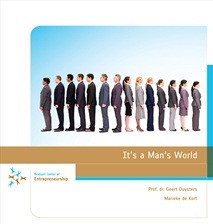Onderzoek O+ over female entrepreneurs and venture capital geplaatst op thenextwomen.com (deel II)
During the recent years two remarkable trends have occurred in the economic sector: a growth of small entrepreneurs worldwide and an increasing number of women that have started their own business. Women’s share of business ownership is growing. Numerous researchers were triggered to investigate the issue of gender and entrepreneurship.
Marieke de Kort, founder of the Dutch on-line community for businesswomen O+ zakenvrouw van nu, has looked into this trend and is interviewed by The NextWomen about her findings. Part I is about the importance of venture capital for businesses. In part II Marieke identifies the informal venture capital issues that women led businesses face.
What kind of research has been done about venture capital for female businesses?
Major studies conducted in the past have contained discussions about the cause of the increased number of female entrepreneurs, whereas others were primarily focused on researching the differences between female and male entrepreneurs. More recent studies have put more emphasis on the general issues of management in female owned business, in particular with regard to the differences in access to financial resources for female entrepreneurs (note 1). These studies have shown that one of the main issues facing women setting up business has been raising finance for their startups. It turns out women obtain one-third of the funding that men secure when starting up their business (note 2).
These women obtain less financing such as bank loans, but they also acquire less informal venture capital (Note 3).
What could be the reason for this?
Some economic specialists argue that female entrepreneurs are not interested in venture capital because they do not aspire to expand their company. Others state that women are interested in the capital but are not acquainted with the procedures to get access to these financial resources. As will be discussed later, this may be caused by a lack of network or by gender issues.
Because women are important contributors to our economy and since in many occasions venture capital enables an entrepreneur to move its business to a higher level, it is important that women do get the necessary finance.
Are women attracted to money?
Although it may seem odd at first sight, some researchers believe that the differences between men and women acquiring venture capital is caused by a lack of interest of women in financial resources. However, this may be explained first of all by the fact that the start-up size of businesses run by women is smaller than that of men. A notable finding in research is that female entrepreneurs often start in business sectors with low capital requirements such as the service sector (Note 4). Second, women are believed to make more use of their own resources, with the exception of money borrowed from family and friends, and less of debt financing such as informal venture capital (Note 5). Therefore, less informal venture capital needs to be acquired from informal investors, which may lead to the fact that women are less interested in informal venture capital than men.
Other researchers conclude that female and male entrepreneurs do not differ with respect to the amount of their own resources used (Note 6). Although women are seemingly interested, results from Becker-Blease & Sohl suggest that the pattern of financing for women-owned businesses in the venture capital industry, where women receive only a small fraction of overall investment finance, is repeated in the informal investment market. This pattern is indicative of the low rate with which women seek financing from informal investors. Conclusively, it is widely held that female entrepreneurs are seeking investment by informal venture capitalist, (Note 7) although data to substantiate this viewpoint is sometimes lacking.
Is there a ‘gender’ issue while obtaining venture capital?
Assuming that female entrepreneurs are actively acquiring venture capital, based on previously mentioned examples, the question remains why women do not obtain as much venture capital as their male counterparts. There are two main opinions about this fact. The first presupposes that there is some sort of gender issue involved. Researchers also concluded that the difference in seek rates appears, at least in part, to be driven by “homosexuality” on the part of entrepreneurs in the informal investor market. That is, entrepreneurs demonstrate a strong preference to seek informal funding from informals of the same sex. Moreover, female entrepreneurs often have difficulties convincing male informals because of different management styles of female business owners. But some women may be openly discriminated against by informal capitalists who feel women are less capable or trustworthy than men. A number of researches (Note ![]() report that bankers perceive men to have more characteristics associated with successful entrepreneurship than women. Lucas (note 9) suggests that lending decisions are driven by issues of profitability, return on investment and the perception that investments are “relatively” safe. Such determinations can be made by examining the experience of entrepreneurs, information accessibility, liabilities of newness and size, and management style. Most of the time women have either no private start up capital whatsoever as mentioned above, or they have a smaller amount of equity capital available, for instance because of lower salary payment in earlier jobs or because family property is usually registered in the name of their husband (note 10), and are therefore less experienced with the acquisition of financial resources. In comparison to their occasional lack of knowledge having a solid business plan and growing potential of their business, this makes that investors do not tend to invest in women entrepreneurs.
report that bankers perceive men to have more characteristics associated with successful entrepreneurship than women. Lucas (note 9) suggests that lending decisions are driven by issues of profitability, return on investment and the perception that investments are “relatively” safe. Such determinations can be made by examining the experience of entrepreneurs, information accessibility, liabilities of newness and size, and management style. Most of the time women have either no private start up capital whatsoever as mentioned above, or they have a smaller amount of equity capital available, for instance because of lower salary payment in earlier jobs or because family property is usually registered in the name of their husband (note 10), and are therefore less experienced with the acquisition of financial resources. In comparison to their occasional lack of knowledge having a solid business plan and growing potential of their business, this makes that investors do not tend to invest in women entrepreneurs.
Any other opinions on this?
Other people focus on the fact that female entrepreneurs are not often in venture networks. Lucas for example suggests that although some have suggested that inaccessibility to capital is a result of discriminatory policies, women entrepreneurs are often absent from important networks. Having access to capital markets requires knowledge about who has capital available and for what purposes. In reality however, this knowledge is not perfectly available and female entrepreneurs often find themselves at a disadvantage in this respect, because they are not part of the important networks that play a role in the capital markets (Note 11).
Another aspect that is important to investors nowadays is the personality of the entrepreneur invested in. Is the entrepreneur someone with a relevant business network? Does he/she have the right skills to be an entrepreneur, will he or she come up with new ideas when business is going down? Therefore, informal investors will rather invest in someone they know or who is familiar with their business friends or other venture capitalists.
What to conclude?
Venture capital can be of major importance for entrepreneurs in order to take their business to the next level. Not only is there a great emphasis on the financial resources themselves, the most important reason mentioned by many entrepreneurs is that most of the informal investors take an active role in the entrepreneurial companies they fund. In particular during the early stages of a company they may give advice on supplier and customer relationships, and provide in-depth knowledge about particular industries. As mentioned earlier, women do not have equal access to venture capital. Consequently they fail not only to get adequate financial support, but also to get the guidance and the access that venture capitalists can provide to the companies invested in.
Do you have any solutions?
A possible solution may be that informal venture capitalists explore the market of female entrepreneurs by adapting their investment strategies. Research will have to be done into what selection criteria can be applied to female entrepreneurs in order for investors to make the right investment decision. Female entrepreneurs may have to move closer to informal venture capitalists by adapting business strategy to venture capitalists, and go along with new ideas and possibilities.
Finally I will say that participation of women in the labor market is the indispensable next step in the process of both globalization and emancipation. Therefore, women need to take the next step, which may be facilitated by venture capitalists. Female entrepreneurs and informal venture capitalists have to join forces to work together towards a stronger global economy.
Note 1 and 2- Carter, S. & Jones-Evans, D. (2006). Enterprise and Small Business. Principles, Practice and Policy. (Second Edition). Harlow: FT Prentice Hall.
Note 3- Becker-Blease, J.R. & Sohl, J.E. (2007). Do women-owned businesses have equal access to angel capital? Journal of Business Venturing 22, 503-521.
Note 6- Rosa, Hamilton, Carter & Burns, 1994 as cited in Verheul, 2001
Note 7- Verheul, 2001; Becker-Blease & Sohl, 2007
Note 8- Buttner & Rosen, 1988; Fay & Williams, 1993 as cited in Becker-Blease & Sohl, 2007
Note 9 and 11-Lucas, L.M. (2006). Capital Accessibility, Gender, and Ethnicity: The case of Minority Women-Owned Firms. New England Journal of Entrepreneurship 9 (1), 41-48.
Note 4 and 10- Verheul, I. & Thurik, A.R. (2001). Start-up capital: Differences between male and female entrepreneurs ‘Does gender matter’? Small Business economics 16 (4), 329-345.
Note 5 -Carter and Rosa, 1998; Honig-Haftel and Martin, 1986; Neider, 1987; Hisrich and Brush, 1987; Olm et al. 1988; Johnson and Storey, 1993 as cited in Verheul, 2001
Other sources consulted: Greene, P.G. & Brush, C.G., Hart, M.M, Saparito, P. (2001). Patterns of venture capital funding: is gender a factor? Venture Capital: An International Journal of Entrepreneurial Finance 3 (1), 63-83.
Link: thenextwomen.com










